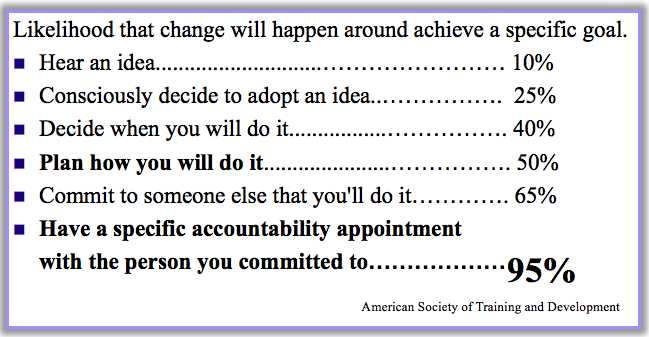
These 4 powers will make your sales coaches better
Steven Rosen knows coaching. As the founder and CEO of STAR Results, he has been helping sales and business unit leaders “crush their numbers” for 14 years, by transferring focus from training to coaching.
According to Rosen, “Over 25 years of research has proven that the best way to get results is not by more training, but by coaching executives, managers, and salespeople one on one.”
For our ongoing blog series on coaching, we interviewed Rosen and asked him to talk with us about his coaching system methodology, and how organizations can use it to improve their overall sales effectiveness. Here’s what he had to say.
Why most companies are failing at coaching
More than 50% of companies don’t have a coaching methodology at all, says Rosen. Managers are left to their own devices and preferences to determine how to coach. Also according to Rosen, 90% of sales management training fails to make a measurable impact. This is an unfortunate state of affairs, because coaching is both a critical and a difficult skill.
A process or methodology, reinforced with management coaching, can make it easier, and the results better. Rosen developed a methodology for this purpose that relies on four “powers” that any coach can harness.
Rosen’s “four powers” form the basis of an effective coaching methodology
Rosen claims that he’s “not a process guy,” but in order to be effective in helping organizations build valuable coaching systems, he has simplified his approach into a four-power methodology that any organization can apply. The four powers are:
- The power of effective questions
- The power of commitment
- The power of pen to paper
- The power of accountability
1. The power of effective questions
Rosen credits the ancient philosopher, Socrates, with discovering the power of asking the right questions. The right questions don’t seek to trap someone or to judge them, but rather to lead them to understanding the problem and solutions for themselves.
“Great coaching starts with asking great questions,” he says. “Nobody wants to be told what to do. Effective questions let salespeople and manager think through their own problems and find the solutions themselves.”
In order to consistently ask good questions, coaches have to shift their mindset from a position of judgment to a position of curiosity. Many coaches make the mistake of skipping straight to “telling” salespeople what to do, because it’s faster and easier to get through the coaching session that way. It takes a mindset shift to understand that coaching is most effective when the salesperson feels at ease and reaches their solutions on their own.
Good questions, Rosen continues, arise naturally out of the mindset of curiosity, but there are a few helpful rules to follow.
- Don’t ask “why” questions like, “Why did you do that,” or, “Why did that happen.” “Why” questions put people on the defense, which naturally puts them in the wrong frame of mind for problem solving.
- Have three or four go-to questions to get started with, such as, “What did you learn from this?” “What would you do differently next time?” and “If you could improve one thing about your job, what would it be?”
- Let your curiosity lead you to additional follow up questions
2. The power of commitment
Even the best coach in the world (especially the best coach in the world) can’t make a salesperson do something that they aren’t committed to doing. Managers who fight with salespeople every month to get their admin work done can attest to this.
That’s because the human mind is wired to resist taking actions that we feel are forced on us and that we have not personally committed to. Great coaching avoids this resistance by combining factual information (such as, “This is a requirement of your job”) with questions (such as, “How can you improve your performance on this matter?”) to guide the salesperson to make commitments to take the actions necessary.
The chart below, from the American Society of Training and Development, demonstrates the power of commitment. Salespeople who hear an idea are only 10% likely to achieve the related goal. When they consciously decide to adopt the idea (commit to it), that percentage goes up to 25%. That percentage continues to go up as you harness the third of Rosen’s powers.

3. The power of pen to paper
As seen in the chart above, salespeople who not only commit to take an action, but who commit to when they will do it and plan how they will do it are far more likely to actually take the action. Coaches can harness this effect by asking salespeople to put pen to paper and produce a written plan.
It’s important that the salesperson do this themselves. The act of writing down the when and how of an action plan causes the brain to pay attention, and to take the matter seriously. As you can see, this simple action increases the odds that the action will be taken from 25% to 50%.
4. The power of accountability
Most coaching in the industry today fails badly on the accountability factor. Managers tend to lean toward “flavor of the day” coaching, as Rosen puts it. With “flavor of the day,” each coaching session touches on a different topic, rarely following up on previous conversations.
As the chart demonstrates, building accountability into the system drives success rates up to an astonishing 95%.
Rosen says he simplifies the commitment and accountability portions of the process for his clients by providing them with a one-page plan template. The template asks the salesperson to identify what they are going to do, why it is important to them, how they are going to get there, and how they are going to measure it.
The coach then asks the salesperson to commit to their plan, and lets them know that they will review it together at their next session. During the next session, the coach will return to the plan and ask how it’s going, what successes the salesperson has had, and any challenges they may have faced with their commitment.
The four powers in action
Rosen has been applying the four powers to his management training and coaching for decades. He says one of his favorite stories to tell is of a sales manager we’ll call “David.” David was a gruff, rugged man who didn’t think he needed to learn to coach.
During their intro meeting, Rosen asked him: “What would you like to work on?” and David said, “I don’t need help with coaching stuff. I just need my reps to do their admin.”
Rosen said that was fine, that they would work on that. Using his own questioning methodology, he asked, “How do you get salespeople to do their admin?”
David said, “I send them reminders constantly.”
Rosen suggested there might be a better way. He introduced David to the four powers, and talked him through a scenario with a salesperson. Using the four powers, David spoke to each salesperson about the importance of admin, and used questions to guide them to a plan of action, to make a commitment, and to put it on paper. He then held them each accountable at the next coaching session.
The results were remarkable and, Rosen says, David became an avid fan of effective coaching the Star Results way. Using the methodology, David found that he could mold his team’s behavior to higher and higher performance, in less time each week.
“Now he focuses on performance instead of babysitting,” says Rosen. “He’s not chasing his tail, so he has better job satisfaction. And he has more time, so he started working out, learned to speak French, and eventually got promoted to VP. He’s still using the methodology with his teams today.”
Rosen’s success with his clients supports data that shows that great coaching, inside a consistent coaching system, is a critical multiplier for sales results. To learn more about building a great coaching system, download our white paper.
 About Steven A. Rosen
About Steven A. Rosen
MBA Author, Coach, Speaker
Steven helps companies transform sales managers into great sales leaders. Steven is the author of 52 Sales Management Tips – The Sales Manager’s Success Guide. To find out more go to http://www.

By George Brontén
George is the founder & CEO of Membrain, the Sales Enablement CRM that makes it easy to execute your sales strategy. A life-long entrepreneur with 20 years of experience in the software space and a passion for sales and marketing. With the life motto "Don't settle for mainstream", he is always looking for new ways to achieve improved business results using innovative software, skills, and processes. George is also the author of the book Stop Killing Deals and the host of the Stop Killing Deals webinar and podcast series.
Find out more about George Brontén on LinkedIn







